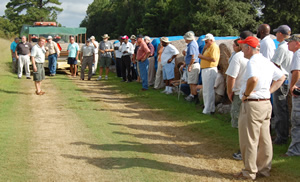 | greenville business & community directory |
|
This is an archived page that may contain outdated or incorrect information. Please visit www.Greenville.com for the latest news, events, and more.
 Palmetto State farmers stand to benefit from what is expected to become a surge in the use and demand for alternative fuels, with a perennial South Carolina crop set to take center stage.
Palmetto State farmers stand to benefit from what is expected to become a surge in the use and demand for alternative fuels, with a perennial South Carolina crop set to take center stage.The U.S. Department of Agriculture has set a goal of 36 billion gallons of fuel used in the United States to come from renewable biofuels during the coming decades, with more than 21 billion gallons to come from cellulose-based feedstock. Of that, about 50 percent is expected to come from southeastern fields, said James Frederick, a Clemson University agronomist who studies the science and technology of utilizing plants for food and fuel, among other applications. A leading crop in the quest will be switchgrass, Frederick said. Switchgrass is a native perennial plant that lives for 10 to 15 years and can grow up to nine feet tall. Historically, it has been used as forage, hay and silage crop, but more recently has taken on a new role. Not least because it is one of the most drought-tolerant warm-season grasses, Frederick said. Switchgrass also is high in cellulose and hemicellulose, and relatively low in lignin, which makes for good conversion to ethanol. �A grower only has to get the ground ready once,� Frederick said. �That saves the farmer valuable time and money.� Frederick spoke to more than 200 growers, producers, farmers and other agri-businesses during the 2010 Pee Dee Farm Field Day Aug. 10 at the Clemson University Pee Dee Research and Education Center here. The event featured tours of the center�s 2,300-acre research fields that included long-leaf pine restoration, switchgrass use as a biofuel, muscadine grapes, soybean and cotton breeding, cotton insect management and peanut varieties, among others. In addition to the tours, the day also featured remarks by S.C. Commissioner of Agriculture Hugh Weathers; George Askew, chief operating officer and associate dean/associate director of agriculture and natural resources for Clemson; and Charlotte Krugler, emergency preparedness veterinarian with Clemson University Livestock-Poultry Health. David Winkle, president of the S.C. Farm Bureau, said that the growth of biofuels could make agriculture an even bigger industry in South Carolina. The sector already is conservatively estimated to generate $35 billion annually, he said. Farmers should embrace change and move with the times, he said. Experimenting with new varieties and crops will help boost the industry statewide. �It�s key to growth,� Winkle said. (Image provided by Clemson.)
Looking for more happenings in the area? Check out Greenville.com's comprehensive visitor center.
|
